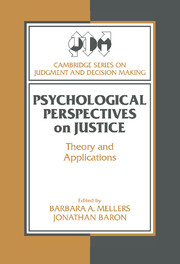Book contents
- Frontmatter
- Contents
- Series preface
- Contributors
- Part I Introduction
- Part II Psychological perspectives
- Part III Economic perspectives
- Part IV Variations in perspectives on justice
- The unfolding of justice: A developmental perspective on reward allocation
- Of ants and grasshoppers: The political psychology of allocating public assistance
- Liberal and conservative approaches to justice: Conflicting psychological portraits
- Part V Policy perspectives
- Part VI Conclusion
- Name index
- Subject index
The unfolding of justice: A developmental perspective on reward allocation
Published online by Cambridge University Press: 24 October 2009
- Frontmatter
- Contents
- Series preface
- Contributors
- Part I Introduction
- Part II Psychological perspectives
- Part III Economic perspectives
- Part IV Variations in perspectives on justice
- The unfolding of justice: A developmental perspective on reward allocation
- Of ants and grasshoppers: The political psychology of allocating public assistance
- Liberal and conservative approaches to justice: Conflicting psychological portraits
- Part V Policy perspectives
- Part VI Conclusion
- Name index
- Subject index
Summary
“Social peace must spring from economic justice.”
– Martin Luther King, Jr. (as quoted in Garrow, 1986)This quote from a winner of the Nobel Peace Prize expresses a hope that many people hold in common. The hope is for a world where peace is secure because it is based on a just distribution of goods. The problem with this vision is that people and nations seem to disagree about what constitutes a just distribution. In this essay we take a developmental approach to the issue of fairness in reward distribution. By doing so, we hope to illuminate some of the potential sources of disagreement about what constitutes a just distribution.
To developmentalists, how concepts of fairness of reward distribution develop in people is intrinsically interesting. We think that a developmental viewpoint on justice should be of interest to researchers who normally deal only with adult subjects. First, because we are looking for developmental differences among people, a developmental perspective emphasizes that not everyone has the same view of what constitutes fairness. Thus, a developmental view sensitizes the researcher to the possibility of individual differences and encourages the search for evidence of the use of a variety of strategies or concepts. In contrast, nondevelopmentalists sometimes seem to assume that all subjects in their experiments are behaving in the same manner. Our viewpoint is that uniformity of strategies and concepts in judgment and decision making should not be taken for granted.
- Type
- Chapter
- Information
- Psychological Perspectives on JusticeTheory and Applications, pp. 183 - 204Publisher: Cambridge University PressPrint publication year: 1993
- 9
- Cited by

